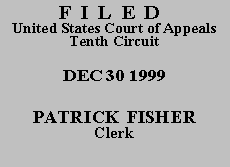

| MICHAEL BRIAN WHITEMAN,
Plaintiff-Appellant, v. RON ORTIZ, Officer, Utah State Prison; (NFN) HUGHES, Defendants-Appellees. |
|
Michael Brian Whiteman brought this action in December 1994 pursuant to 42 U.S.C. § 1983 against defendants Ron Ortiz, Joe Hughes and others alleging that they violated his constitutional rights to be free from cruel and unusual punishment and to equal protection while he was incarcerated in the Utah State Prison. The district court granted summary judgment to Ortiz and Hughes and dismissed the claims against the other defendants under 28 U.S.C. § 1915(d) (now designated § 1915(e)). Whiteman appeals only the grant of summary judgment in favor of Ortiz on his Eighth Amendment claim.(1) We review the district court's grant of summary judgment de novo. See Anderson v. Coors Brewing Co., 181 F.3d 1171, 1175 (10th Cir. 1999).
We view the facts, supported by valid summary judgment evidence, in the light most favorable to Whiteman, the party opposing summary judgment. See id.; Fed. R. Civ. P. 56(c).(2) Following his conviction for murder, Whiteman began serving his sentence at the Utah State Prison on November 26, 1993. Ortiz' only involvement in Whiteman's incarceration occurred in December 1993, when he conducted Whiteman's intake into the prison's Uintah III facility. During the intake, Whiteman informed Ortiz that he had been convicted of killing a "Mexican Gang Member," and he requested verbally and in writing that he be housed in seclusion from known Mexican gang members. See R. Vol. I, Doc. 14 at 7-8. Ortiz told him that there were Mexican gang members throughout the Utah State Prison, and Ortiz assigned Whiteman to Uintah III, Section 2, which contained what Whiteman alleged were "known to be violent gang members." See id. at 8. Whiteman did not object to being housed in this section, nor did he request a housing reassignment. Nearly six months later, "a high ranking gang member" was transferred to the same facility and several hours later, Whiteman was attacked and beaten by members of that gang, of which the individual Whiteman murdered was also a member. See id. He contends that by assigning him to that particular section, Ortiz was deliberately indifferent to his safety and thereby violated his Eighth Amendment right to be free from cruel and unusual punishment. See Farmer v. Brennan, 511 U.S. 825, 832-34 (1994).
"[P]rison officials have a duty to protect prisoners from violence at the hands of other prisoners." Id. at 833 (quotation omitted). To prove a breach of this duty rising to the level of an Eighth Amendment violation, a prisoner must show both that he or she was "incarcerated under conditions imposing a substantial risk of serious harm," id. at 834, and that the prison official acted with deliberate indifference, which means that the official
knows of and disregards an excessive risk to inmate health or safety; the official must both be aware of facts from which the inference could be drawn that a substantial risk of serious harm exists, and he must also draw the inference.
Id. at 837.
We agree with the district court that Whiteman's generalized concern regarding his fear of "Mexican gang members" was insufficient to establish the substantial risk of serious harm necessary to support his claim. See Riddle v. Mondragon, 83 F.3d 1197, 1204-06 (10th Cir. 1996) (holding, in affirming dismissal of complaint, conclusory allegation of fear due to sex offender status insufficient to establish substantial risk of serious harm); Davis v. Scott, 94 F.3d 444, 447 (8th Cir. 1996) (finding no deliberate indifference where there was "no solid evidence . . . of an identifiable serious risk to [prisoner's] safety"). Moreover, Ortiz' minimal involvement in Whiteman's incarceration, Whiteman's failure to object to his placement in Section 2, and the lapse of time between the placement and the assault further support the conclusion that Ortiz was not deliberately indifferent to or aware of an excessive risk to Whiteman's safety.
Whiteman also challenges the district court's refusal to appoint counsel to represent him. The district court has discretion to appoint counsel in a civil case, see Shabazz v. Askins, 14 F.3d 533, 535 (10th Cir. 1994), and Whiteman has not demonstrated that the court abused its discretion in not appointing counsel here.
Whiteman's request to proceed in forma pauperis is GRANTED. The judgment of the United States District Court for the District of Utah is AFFIRMED.
Entered for the Court
Circuit Judge
*. This order and judgment is not binding precedent, except under the doctrines of law of the case, res judicata, and collateral estoppel. The court generally disfavors the citation of orders and judgments; nevertheless, an order and judgment may be cited under the terms and conditions of 10th Cir. R. 36.3.
1. In his reply brief, Whiteman stated that he was not appealing the summary judgment in favor of Hughes. He failed to file objections to the magistrate judge's report, which the district court adopted, recommending that the other defendants be dismissed under § 1915(d). He therefore could not appeal, nor does he appear to try to appeal, the dismissal of those defendants. See Moore v. United States, 950 F.2d 656, 659 (10th Cir. 1991). Finally, there is no indication in his appellate briefs that he is attempting to appeal the denial of his equal protection claim, and, for that matter, there is virtually nothing in his complaint to support such a claim.
2. Whiteman's amended complaint was verified, and we therefore treat it as an affidavit. See Conway v. Smith, 853 F.2d 789, 792 (10th Cir. 1988).